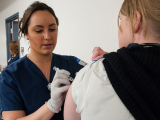Nov 12, 2012
Italy lifts ban on use of Novartis flu vaccines
Italy has lifted its ban on the use of three Novartis influenza vaccines after determining that particles seen in certain lots posed no health risks, according to Agence France-Presse (AFP). Italy's drug regulatory agency said on Nov 9 that it had conducted "in-depth checks" on the Fluad, Agrippal, and Influpozzi vaccines and found no concerns, AFP reported. Italy ordered the ban in October. Six European countries and Canada had suspended use of Novartis flu vaccines because of protein particles seen in some doses, but Canada and Switzerland lifted the suspensions on Oct 31.
Study: Flu vaccine rates in pregnancy stayed fairly high after pandemic
A single-site survey suggests thatthe share of pregnant women receiving influenza vaccine declined slightly the year after the 2009 H1N1 pandemic but remained above 50%, according to a report in Vaccine. Investigators with the Christiana Care Health System in Newark, Del., conducted cross-sectional surveys of postpartum women who delivered at their institution from February through April 2010 and February through March 2011. During 2010-11, 165 (55%) of 300 women surveyed received a flu shot, compared with 191 of 307 (62%) during 2009-10. Vaccination by an obstetrician was common but decreased from 71% to 60%. Although three fourths of women said their providers recommended flu vaccination, the prevalence of a discussion about the vaccine dropped from 24% to 11%. Safety concerns about the vaccine, however, also dropped, with 66% of women in 2009-10 voicing such concerns but only 27% doing so in 2010-11.
Nov 10 Vaccine abstract
DHS contract focuses on social media as biosurveillance tool
Accenture Federal Services recently won a $3 million, 1-year contract to help the Department of Homeland Security (DHS) test the use of social media for biosurveillance. In a Nov 8 press release, the company, based in Arlington, Va., said it will create a pilot program that will use data from social networking and social media sites to help the DHS Office of Health Affairs better predict and respond to infectious disease outbreaks and biological attacks. The project will also help improve data sharing and collaboration between the OHA and its partners, the statement said. "Rapidly collecting and understanding what information is being shared [via social media] will help OHA meet its mission to detect and respond to potential threats to national health security," John Matchette, leader of Accenture's public safety agency work, said in the release. Accenture Federal Services is a subsidiary of Accenture LLP, a global management consulting, technology services, and outsourcing company.
Nov 8 Accenture press release
Groups report polio coverage problems in Pakistan, Somalia
Five cases of circulating vaccine-derived poliovirus (cVDPV) type 2 polio, a rare strain, have been detected in children in Balochistan, one of Pakistan's four provinces, according to a Nov 8 joint statement from health groups, as reported by Karachi-based The News International. Persistently low immunization coverage in two of Balochistan's districts and campaign performance gaps have contributed to the emergence of the strain, a pattern that has been seen in other countries that have struggled with similar polio immunization problems. The virus, less virulent than wild poliovirus and battled with the same measures, was found in four children in Qilla Abdullah district and one in Pishin district.
Nov 10 News International story
In other polio developments, the United Nations (UN) said recently that about 135,000 children in Somalia's port city of Kismayo are at risk for polio, due to a ban on polio vaccination put in place 3 years ago by the Al-Shabab insurgent group, according to a Nov 9 report from IRIN, the news service of the UN Office for the Coordination of Humanitarian Affairs. The UN group also said kids in southern and central regions of Somalia are at risk due to low polio vaccine coverage rates because of conflict and problems with inaccessibility.
Nov 9 IRIN story


















